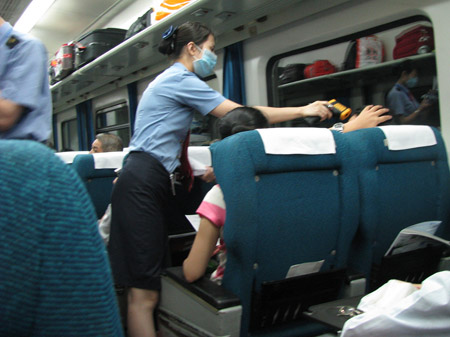Swine Flu Closes More Schools But Hong Kong Residents Are Calm

Train passengers get their temperatures taken during a trip between Hong Kong
and Guangzhou, China, to help prevent the spread of swine flu. Last week schools
were closed throughout Hong Kong. (Creative Commons licensed)
HONG KONG -- Residents here say the recent precautions the government has taken to curb the swine flu outbreak may be an overreaction, even if the spreading virus forced another school to shut down on Tuesday.
The World Health Organization declared swine flu, or A(H1N1), an official global pandemic last week and the Hong Kong government shut down all primary schools for two weeks. The first domestic cases of swine flu were confirmed last week when 12 students at St. Paul's Convent School contracted the virus without traveling outside the country. The number of infected students at the school has since risen to 20.
So far over 100 cases of the A(H1N1) virus have been confirmed in Hong Kong, according to health authorities.
Over the weekend, eight flu clinics opened up around the city to treat those with symptoms of the virus and to prepare for the coming flu season, which is set to reach its peak over the next few weeks.
"Now we are shifting our gear from the containment phase to the mitigating phase," said Thomas Tsang, the controller for Hong Kong's Centre for Health Protection, at a press conference on Monday.
While officials are acting quickly to curb the spread of swine flu, Hong Kong residents are less concerned.
Ip Siu-fong, a woman working in a traditional Chinese medicine store in the city's Wan Chai district, said that since the swine flu scare customers have started buying more medicine to boost their immunity. She, however, was unconcerned. "I don't care," she said. "If we keep ourselves healthy, there's no need to worry."
Expert on infectious diseases Dr. Lo Wing-lok said that the government's efforts to control the spread of swine flu were more for show than anything else.
"There is no scientific measurement to show that the action of the government has actively delayed an outbreak," Lo said.
According to Lo, protecting oneself against swine flu is just a matter of basic hygiene.
"We don't have much flu because of the measures taken against SARS," he said.
In 2003, severe acute respiratory syndrom swept through the city of Hong Kong and ultimately killed 299 people. The government was criticized for what was perceived to be a delayed response to the public health threat.
The precautions implemented against SARS have been reinstated to combat the spread of swine flu. People entering Hong Kong are screened for unusually high temperatures at the international airport.
Hand sanitizer is available in both public areas and private establishments. Signs and stickers posted in elevators announce that they are sanitized regularly, and some of the elevators have their buttons covered with protective plastic. Subway trains are disinfected every day.
Kevin Ku, a supervisor at a cell phone store, said that Hong Kong residents should just take care of themselves and stay healthy.
"I check the news, only 100 people are dead," said Ku. "SARS was different."
Approximately 190 people have died from the current outbreak of swine flu, but almost all of the deaths have been in the United States and Mexico. There have been no deaths in Hong Kong.
Francesca Ayala is a journalism student at USC's Annenberg School for Communication. She is participating in a study abroad program in Hong Kong this summer.



